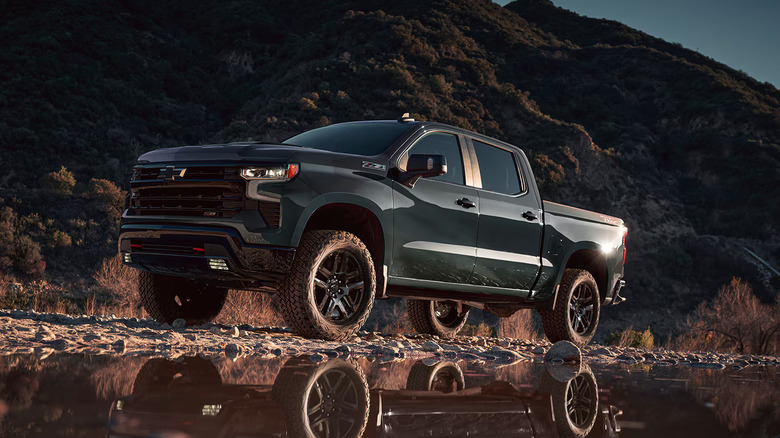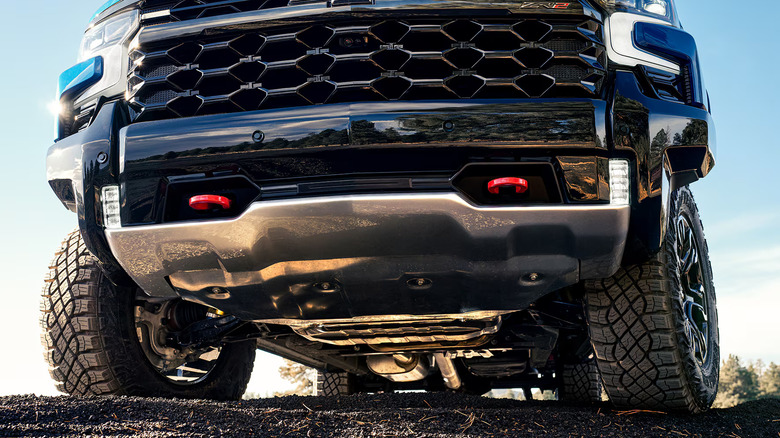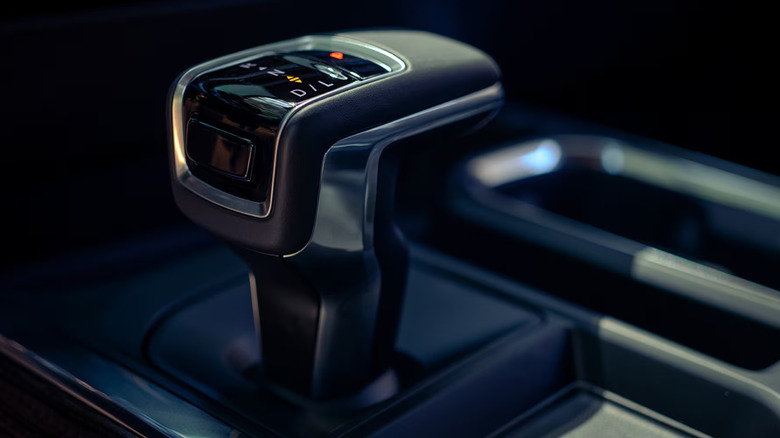What Causes The 'Chevy Shake' And Is It Covered Under Warranty?
For nearly a decade, GM full-size trucks and SUVs have carried a reputation for what drivers call the "Chevy Shake": An unsettling vibration at highway speeds that can cause seats to shake. In reality, however, "Chevy Shake" has come to describe two separate problems. The automaker itself doesn't use that phrase, but it instead has published multiple Technical Service Bulletins (TSBs) that separate the issue into two categories.
On one side, there's the highway vibration that plagues some 2014-2019 Silverado and Sierra 1500s, where drivers report a steady shake at highway speeds. On the other hand, there's GM's infamous 8-speed automatic transmission shudder that affects models like the Camaro, Corvette, Colorado, and Silverado from 2015-2019. The "Chevy Shake" points to a driveline vibration issue, caused by the driveshaft. The second is linked to torque-converter clutch behavior inside the transmission. GM has issued technical service bulletins for both, and in some cases, recall campaigns or warranty-covered repairs.
If you're under GM's three-year/36,000-mile bumper-to-bumper or five-year/60,000-mile powertrain warranty, you may be covered; but only if a dealership can reproduce the issue and confirm it meets GM's criteria for repair. Outside of it, owners are usually footing the bill unless they bought extended coverage.
Driveshaft imbalance is the harder problem to fix under warranty
The driveshaft problem is the original "Chevy Shake" problem, and its complaints mostly came from 2014–2019 Silverado and Sierra 1500s, though some owners of Suburbans and Tahoes also noticed it. These drivers described intense vibration at 60–70 mph, often with no obvious cause. GM eventually traced this to possible runout in the aluminum driveshaft, meaning the shaft was ever so slightly out of balance; just enough to vibrate at highway speeds.
GM also cautions dealers not to assume the driveshaft itself is defective. Its service guidance highlights that other factors, like improper mounting angles or tire imbalance, are often the root cause. This is why some trucks smooth out after nothing more than a precise road-force balance or revised cab mounts, while others require replacing the driveshaft itself. Legally, GM has faced class actions alleging that the aluminum driveshaft is a design defect. However, because there's no single point of failure to isolate, GM treats it as a service issue, not a widespread recall. The only driveshaft-related safety recall on record (NHTSA 20V650) applied to 42 2019-2020 GM trucks with a supplier weld defect.
That's a recall, so it's free regardless of warranty status for the VINs included. For trucks outside that specific campaign, GM instructs dealers to follow Preliminary Information bulletin PI1354I, which outlines the full vibration diagnostic process. If the condition meets GM's internal thresholds, repairs may be covered under the standard bumper-to-bumper warranty.
Transmission shudder is easier to diagnose and most likely covered
Unlike the driveline-related shake, trucks and cars equipped with GM's 8L90 or 8L45 8-speed automatic transmissions are prone to a different kind of vibration, one that comes from inside the torque converter clutch, not the driveline. Under light throttle between 25 and 80 mph, it can feel like the car is riding over rumble strips. GM confirmed the issue in Service Bulletin 16-NA-175, which applies to many 2015–2019 models, including the Corvette, Camaro, Silverado 1500, and Colorado.
The problem happens when the original transmission fluid breaks down, which makes the torque converter clutch struggle to stay locked. The fix, according to 18-NA-355, is a full flush using Mobil 1 Synthetic LV ATF HP specifically. If that doesn't solve it, 20-NA-142 directs techs to replace the torque converter, but only if they find metallic debris. This repair is usually covered under the five-year/60,000-mile powertrain warranty, and GM even provides labor operation codes for dealers to submit claims.
That said, once you're out of warranty, you're likely paying out of pocket: There's no recall (unlike the driveshaft recall), no reimbursement program, and no special extended coverage tied to this issue. Lawsuits have been filed, but the courts haven't forced GM to act. In fact, a federal appeals court decertified a major class-action suit in 2025, which leaves smaller state cases still pending. To make matters messier, GM later added language noting that shudder at low speeds might be a "characteristic of design," or otherwise normal, giving dealers room to deny borderline claims, especially on higher-mileage vehicles.


